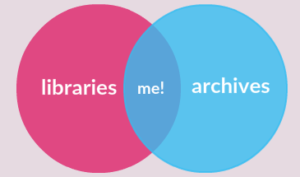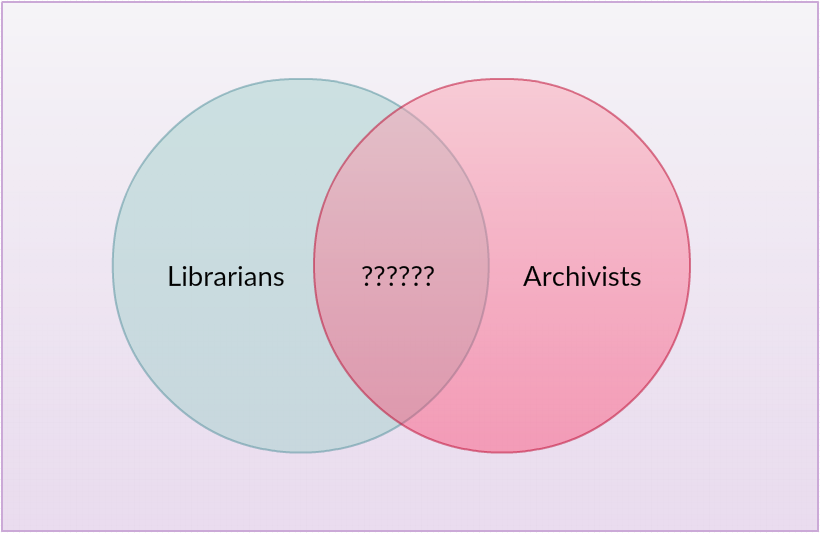I realised last week I hadn’t written for GLAM Blog Club for a couple of months, and considering how much I admire newCardigan and their ethos I figured I should contribute to the conversation, instead of standing on the periphery. I also have several draft blog posts for which I can’t quite make the magic happen, so I might as well write about something simple—myself.
Like a great many librarians, I started out in life ‘loving books and reading’. We scorn LIS students who say this in interviews, forgetting that many of us were once the same way. Yet it’s true that there’s far more to librarianship than reader’s advisory, and I’ll be the first to emphasise this to prospective library workers. It’s one thing to recognise what brought you here, but quite another to think that that’s all there is.
For this blog post I fished out my application letter for my MIS, written in early 2014. It was a turbulent time for me. I was working as a call-centre operator, a horrible job with a 3-hour roundtrip commute, that I’d only taken in the first place because I’d been summarily let go from a mininum-wage warehouse gig five months earlier. Understandably I was keen to improve my lot, and cast about for jobs I thought I’d enjoy.
The letter brought back to me how much of my childhood I had spent in my school library, playing computer games, passive-aggressively rearranging books, chatting with the librarian about our shared love of teddy bears. Yet I’m struck by how little my letter followed the ‘loves books and reading’ trope. My early library experience didn’t revolve around books—it revolved around knowledge. Books, computer games, newspapers, you name it. I was a sucker for knowledge. I lapped up every bit of text I could get my hands on, not to escape my life but to enrich it. I wanted others to explore and enjoy knowledge like I had, no matter their age.
I finally realised that my ideal career had been staring me in the face this whole time.
I decided to become a librarian.
So I set about trying to make it happen. I learned I needed a master’s degree. I already had a bachelor’s in Classics and Ancient History, a discipline not known for its job prospects, so I was well-placed to deflect the inevitable ‘wow another useless degree!’ comments. I learned that the average age of librarians was… quite high, and that I would have to enrol in an online course. One came highly recommended by a friend of the family, though if I’d known then what I know now I think I would have chosen differently.
I titled my application letter ‘Why I’d Make A Great Librarian’, in a desperate act of self-confidence. I don’t know if I’d be that conceited about it now. I wouldn’t describe myself as a ‘great’ librarian. I would say I’m ‘a librarian with a lot to offer’, letting my actions speak for themselves.
Looking back, I should have seen it coming. Of course I was going to wind up in metadata and collection development, with high school reminiscences like this:
Why were all these books, which were clearly relevant to my essay, at opposite ends of the library? Why did the library have such gaps in its collection? Why was there only one copy of Scullard’s From the Gracchi to Nero in the entire school, and why was it always borrowed by somebody else? (And why didn’t they use Library of Congress classification, which was, like, way better than Dewey?)
What a nerd I was. What a nerd I am. (For the record, I’m pretty sure LCC would have made fetching ancient history books worse, because the distance between B and P classes would be greater than between 800s and 900s, but I digress.)
To my astonishment, I was accepted into the MIS degree, and things began to look up. I had a couple of jobs in a large, swanky library, where I got a feel for how great (and how awful) librarianship can be, and about a year ago I started the job I have now. Quite how I got a professional-level role despite not having quite completed my MIS, I have no idea, but I’m acutely aware of how lucky I’ve been. I know so many people desperate to get into libraries and I’m sure people must think sometimes that I’ve just waltzed in. It’s difficult being a decade younger than the rest of my at-level colleagues, but what I lack in work experience I make up for with enthusiasm!
So here I am. I’ve taken a slightly more roundabout route to get here, but I feel my life experience has served me relatively well. If nothing else, I’ve come to appreciate the value of giving back. As a librarian, I would not only have the opportunity to organise, process and store ever-increasing amounts of information, but also the privilege of helping others find and draw on that information to improve themselves and society as a whole. Plus I would get to be around books and computers and knowledge all day!
Becoming a librarian has been one of the great joys of my life. I can’t think of any other career that would suit me better. I’m immensely thankful to those who helped me get where I am today, but especially to my mum, who surely must have wondered sometimes whether I’d ever get out of the call centre. I’m still a sucker for knowledge, but now I get paid to share that knowledge with others and help them find their own. It’s quite a privilege.
I didn’t think I’d make it. And yet, here I was.

